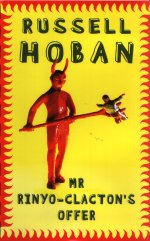Back to The Head of Orpheus: a Russell Hoban Reference Page (home page).
Things don't end; they just accumulate.
--Jonathan Fitch, Mr Rinyo-Clacton's Offer (epigraph to book)

Mr Rinyo-Clacton's Offer (1998)
A Novel by Russell Hoban
EDITIONS I KNOW OF:
- Hardcover - Jonathan Cape, London, 182 pp. ISBN 0-224-05121-0
AVAILABILITY
Mr Rinyo-Clacton's Offer is available as part of the Russell Hoban Omnibus from Indiana University Press, marking its first US release. Like Fremder it has never been released in softcover, and the original Jonathon Cape hardcover is no longer available in the UK. Sometimes used or imported copies can be found on the Bibliofind site.
DESCRIPTION:
Mr. Hoban's 1998 novel is the tale of twenty-eight-year-old Jonathan Fitch, who's been dumped for infidelity by his girlfriend and thinks he's ready to die. As he sits despondently in the Underground, he's approached by Mr. Rinyo-Clacton, an immaculate, aristocratic opera buff who turns out to be a kind of aficionado of death (he tells Jonathan that his first initial, T., stands for "Thanatophile"). Mr. R-C calls Fitch's bluff by offering him a million pounds for the pleasure of "harvesting" his death in a year's time. Fitch is soon in an agony of fear, remorse and guilt as Mr. R-C's web ensnares not only himself, but a kind, sixty-something psychic named Katerina, as well as Fitch's estranged girlfriend Serafina. Although any synopsis of the plot (not to mention the book's cover) immediately calls to mind Faust, Mr. Hoban has said that he doesn't see the book as a Faustian story, and of course he's right. It's not a story about greed or temptation; it's about death, power and the complexity of human relationships.
NOTES:
Those who've read Pilgermann may notice that Mr. Rinyo-Clacton seems very much like another incarnation of Bruder Pförtner, the acid-tongued, priapic apparition of death that accompanies Pilgermann on his journey. This is in keeping with the pattern of recurring motifs, symbols and character types in Mr. Hoban's work: add Death to the list that also includes lions, owls, Orpheus & Eurydice, The Little Tribunal of the Dusk, dragonflies, marzipan, the word "tawny," the work of Vermeer and Rilke, the terror of being, the difficulty of waking, and the nameless thing that inhabits our bodies and looks out through our eyes.
REVIEW QUOTES:
"The greatest energy in the writing, too, is reserved for the human core of the novel...a stunning feat of compression and, more impressively, at times almost intolerably true."
--John Forsyth, Pure Fiction
OTHER REVIEWS AND ARTICLES:
MEMORABLE LINES AND PASSAGES:
'You call yourself Mr Rinyo-Clacton,' I said...'Rinyo-Clacton is the name given to a Late Neolithic pottery style found in Scotland and southern England.'
'What are we but clay,' said Mr Rinyo-Clacton, 'and infirm vessels all.' (p. 6)
I was back at my flat at about half-past three that morning. When I turned on the lights the place came out of the darkness like an animal caught in the headlamps of a car. (p.13)
The house of myself is built on a rock of panic. Now the house was gone and only the panic remained. (p. 17)
She took my hands again. 'In each of us lives the little animal of the self: nothing to do with the mind, it goes its own way; there is no talking to it. Sometimes it wants to live; sometimes it wants to die. Maybe you are in hospital for surgery, and while you are anaesthetized the little animal of the self makes up its mind. "OK," it says, "this time I don't die." Or it says, "That's it--I have had enough and now it's time to pack it in."' (p. 35)
'Katerina, I thought you were a clairvoyant, not a shrink.'
'Have you ever watched Oprah Winfrey? These days everybody is a shrink.' (p. 37)
Things don't end; they just accumulate. (epigraph to book)
Back to The Head of Orpheus: a Russell Hoban Reference Page (home page).
Russell Hoban's other novels and collections:

